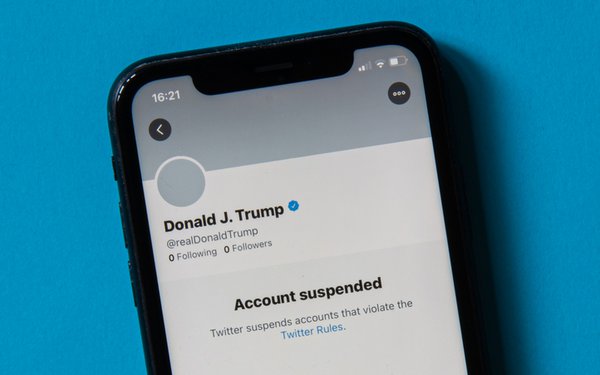
Former president Donald Trump on Friday sought a court order
requiring Twitter to restore his account.
In a 38-page request for an injunction, Trump's lawyers argue that his continued absence from Twitter could hurt the Republican Party's chances of
winning future elections.
Twitter “exercises a degree of power and control over political discourse in this country that is immeasurable, historically unprecedented, and profoundly
dangerous to open democratic debate,” his lawyers write in a motion filed with U.S. District Court Judge Robert Scola, Jr., in Miami.
“By de-platforming the presumptive head and
most popular member of the Republican Party, cutting him off from the most effective and direct forms of communication with potential voters, defendant is threatening irreparable damage to the
Republican Party’s prospects in the 2022 and 2024 elections,” the former president's legal team adds.
Twitter, as well as Facebook and YouTube, banned Trump in January, shortly
after his supporters stormed the Capitol in an effort to prevent the Senate from certifying President Joe Biden's victory in the last election.
In July, Trump, as well as others who were
blocked by the three companies, sued them in federal court in the Southern District in Florida. Trump claimed in those lawsuits that Facebook, Twitter and YouTube are “state actors” --
meaning equivalent to the government -- and that their editorial decisions about content amount to unconstitutional censorship.
The First Amendment prohibits the government -- not private
companies -- from censoring speech. But Trump's lawyers argue that Twitter's suspension of his account should be considered “state action,” equivalent to censorship by the government, on
the theory that the government “coerced” and “encouraged” Twitter to suppress Trump's speech.
“While government officials are permitted to express their, or the
government’s, preferences about what a private company should or should not do, they cannot exert coercive pressure on private parties to censor the speech of others,” his lawyers argue in
the request for an injunction.
Trump's lawyers specifically argue that Twitter suspended him due to pressure by Congress and the executive branch of government -- even though Trump headed the
executive branch when he was suspended.
“Since 2019, Democrat [sic] members of the United States Congress, as well as now-President Joe Biden, have subjected social media companies and
their CEOs, including Defendant, to increasing pressure to censor speech disfavored by them, and to promote their favored speech, or else face catastrophic legislative and/or regulatory
consequences,” his lawyers write, apparently referring to the possibility that Congress could repeal or revise Section 230 of the Communications Decency Act.
His legal team elaborates
that in April of 2019, Speaker of the House Nancy Pelosi warned that Section 230 of the Communications Decency Act could be in jeopardy.
Throughout 2020, Trump himself repeatedly called for
the repeal of Section 230 -- a 25-year-old law that protects internet companies from liability for unlawful posts by users, as well as for decisions regarding content moderation.
Dozens of
other people have claimed in lawsuits that tech companies violated the First Amendment by suppressing speech. So far, tech companies prevailed in all of those disputes, according to Santa Clara Law professor Eric Goldman, who has studied the
issue.